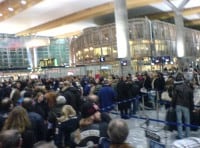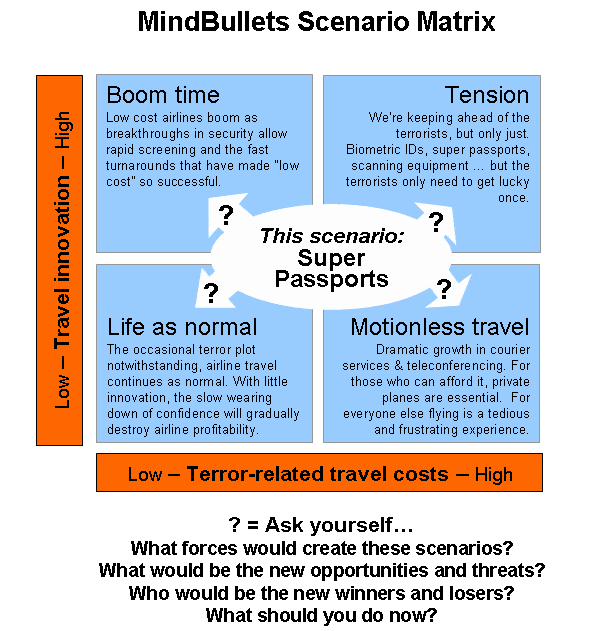
‘SUPER-PASSPORTS’ CAUSE PROTESTS AT JFK AND LAX

Passengers demonstrate against new travel elite
- Dateline
- 20 May 2007
“It’s discrimination and it’s un-American!” So says Elizabeth Negroponte of the American Association for Civil Liberties.
Over the past two months a new travel elite has emerged. If a passenger chooses to volunteer and join the ‘Super-Passport’ queue at major airline departure points around the world, they are treated with the kind of respect normally accorded to visiting heads of state and royalty.
“We know they can be trusted,” says Karl Smith of the FBI. “Super-Passport volunteers have been through a thorough check-in examination. They have opened up their lives; even appeared naked before security officers. In exchange for this incredible invasion of their personal space, international law-enforcement agencies are happy to allow them to go where they like, when they like, and with a minimum of fuss.”
So, while the rest of us aren’t even allowed to take our own books onto any airplane, Super-Passport travelers can carry on any luggage they like.
This correspondent sat for several hours on a London to New York flight in despair and boredom while a Super-Passport across the aisle used her laptop computer to do office work and play video games.
ANALYSIS >> SYNTHESIS: How this scenario came to be
Background
If business travel isn’t to be completely obliterated by the new changes to airline travel removing their ability to work during long journeys then some parallel system is going to be required to ensure that the people most needing to travel are not disadvantaged. The most likely response to this is going to be that individuals who agree to give up some of their privacy get to live normal lives while the rest of us have to make do with increasing inconvenience.
August 2006: Airline Terror
On 14 August 2006 the world awakes to yet another terror plot. This one is safely foiled by British agents working with both the US and Pakistan. The damage to travel is almost as severe as if the attack had taken place.
Millions of people are inconvenienced. Most are philosophical but many start to complain as the delays go into months. Airlines are worried. Business commuters, their most important market, are starting to drive, take trains or even teleconference.
Says Jared Ogg of international law-firm Walberg Kravis Pital, “We’ve just spent US$ 4.5 million upgrading our offices. We installed a customized Sony conference centre. Sure, it was expensive but we’re more productive. To spend six hours in transit on top of a four hour flight was just insane. We get a lot more done.”
Yet some meetings must take place in person. Lots of site visits require personal scrutiny.
December 2006: Christmas Alert
On 22 December 2006 another disaster is averted.
“I was returning from the canteen, going back on shift, when I saw this guy. He didn’t look any different, but he was sweating.” This observation by Manny Stankovic at LA International Airport causes consternation during the Christmas rush. Twenty-two year-old Sedic Harabi is arrested and found to be carrying a book soaked in the highly explosive Astrolite. This chemical is so stable and dispersive that it can maintain its full characteristics in any medium.
Gerald Hurst, the inventor of Astrolite, has this to say: “It was designed to be easy to carry and use. The liquid can be soaked into anything and still retain its explosive characteristics. I’m sorry to say it, I’ve invented the perfect terrorist weapon.”
Books are banned. All carry-on luggage is banned. New blow-back machines are rushed into service that blow air over people and then ‘sniff’ the results. These are expensive (at US$ 250,000 each) and very slow as they check a library of ‘smells’.
Dell announces a new free direct transfer service for all Dell notebook owners. This is in response to the collapse in their slim-line notebooks usually preferred by business travelers. “We can’t expect people to buy notebooks for travel that they then can’t use while traveling,” says an anonymous spokesman. “We have to get them to buy again; if we have to move their computers around for them to make it safe, we’ll do it.”
It is a very quiet Christmas. Both the US and EU governments announce a package of cash bail-outs to assist airlines who face insolvency.
January 2007: Opt-In
International business travel awakes to 2007 in disarray. “We’re not going anywhere,” says Delia Rasmussen at the asset managers, Gaullaume & Thetard. “We need to send our consultants to evaluate factories across Europe and the US but no-one wants to spend eight hours traveling without being allowed even the luxury of a book to read.”
Civil liberties groups rebel when body imaging systems are introduced in London and New York. “Look, we understand the problems of terrorism, but you’re not going to get people to agree to walk through a machine that guarantees a strip show to security guards,” states Carol Benmore of Human Rights Watch.
“Couldn’t we just make it an opt-in system?” asks an exhausted business traveler who has been sitting in Heathrow’s departures for three hours.
Airport administrators take note and create a long passage of sensors at a few major airports. People walking through the 25 metre tunnel are blasted with air, bombarded with backscatter X-rays and subjected to a barrage of tests designed to check their blood pressure, mental and physical state. “But, if you don’t want to go through the tunnel, we won’t force you,” says John Abernathy, director of transport at Heathrow. “Unfortunately, that does mean you’re going to spend three hours going through the usual process.”
The volunteers are soon being known, not politely, as ‘Super-Passports’.
March 2007: Exposure Outrage
At first there is a rush to participate in the new scheme. Business travelers, in particular, are quick to respond. “If I can save two hours travel time by letting some lad have a look at my john-thomas, then so be it,” says Harold Davies, a regular commuter.
“I don’t enjoy some guy ogling my breasts, but I can’t spend so much time sitting around,” says Alice Thomson, a well-endowed executive.
Then a video is posted on YouTube showing dozens of people striding naked through the departure tube at New York International. The response is hurried and embarrassed. Liberties groups are quick to point out that this is exactly what they feared. Security guards are fired, the rest are sent on sensitivity courses. But the damage is done. Women are most affected.
“We’re finding that women are resigning from top executive jobs that require plenty of travel. That’s all of them. There seems to be a new glass ceiling which is basically the idea that you have to be a porn star to do your job. Guys are less worried about this type of thing since the security guards are mostly men. Women are mortified. We don’t know what to do.” Eric Venter at international bank UBS echoing the sentiments of managers around the world.
“Yes, the new system is great. It balances the needs of those obsessed with privacy with those who value their time. We love the fact that it is voluntary. But it is also reinforcing the problems that women have in the business world.”
Lost in all the debate is the loss of freedom and mobility we all associated with airline travel.
May 2007: Loss and Recovery
“Bookings are down. I think everyone is suffering,” says Carol du Plessis of Sun International. It is expected to be the worst tourism season on record as people cancel their bookings for fear of a repeat performance of December 2006.
But there are winners.
Eyenetwork, a UK-based video conferencing service, is perfectly situated to take advantage of the new demand. “We used to have about 200 teleconferences a week. We’re up to 3,500 now and still growing. We’ve just spent about US$ 4 million on new equipment. And we’re hiring,” says an excited CEO, Lisa Honan.
Private airlines are booming. “Companies are simply chartering their own planes for regular flights. IBM, Microsoft, Unilever and Mittal all launched their own company airlines last week. Procter & Gamble placed an order for 15 Bombardiers this morning,” says a delighted Victor Matthews of Bombardier, makers of Learjets and Bombardiers. “We’ve also been inundated with requests to join our executive jet time-share program: Skyjet.”
And airlines have been quick to introduce libraries of all the popular summer books on every flight. “We’ve added in new features too – our passengers can buy toiletries, even rent computers linked to the Internet so that they can work while travelling,” says one industry insider.
Holiday resorts are going even further. “We have started finding out more about what our guests are doing on vacation. We now rent equipment on their behalf, arrange permits … that sort of thing. We figure that they’ve been waiting in queues so long just to get here, why should we force them to wait any more?” So says Heidi Boon of the Happy Hideaways resort in Bali.
That may not be enough.
“We’re seeing more traffic than ever, and it’s not even the vacation season yet,” grins Bill Reese at his I-95 highway rest stop in Florida. “We’re building a whole new restaurant and welcome area. Looks like it’s going to be a fantastic season.”

Links to related stories
- New baggage screening system being unveiled at airport, Clayton News Daily, 13 August 2006
- Despite advances, airline security is far from perfect, Times Argus, 23 August 2006
- Airport security regime hits an executive nerve, International Herald Tribune, 11 August 2006
- New regulations force traveling outside box, Citizen Times, 22 August 2006
- MindBullet: SMART LUGGAGE IS 21ST CENTURY JEEVES (Dateline: 14 October 2008, Published: 10 March 2005)
- MindBullet: BILL GATES REFUSED ENTRY AT HEATHROW TERMINAL 5 (Dateline: 6 February 2012, Published: 14 April 2005)
- MindBullet: CARRY-ON BANS CREATE BOOM IN NEW TRAVEL AND HOTEL SERVICES (Dateline: 1 August 2007, Published: 17 August 2006)
- MindBullet: HERTZ VOTED BEST AIRLINE (Dateline: 16 July 2020, Published: 22 April 2004)
Warning: Hazardous thinking at work
Despite appearances to the contrary, Futureworld cannot and does not predict the future. Our Mindbullets scenarios are fictitious and designed purely to explore possible futures, challenge and stimulate strategic thinking. Use these at your own risk. Any reference to actual people, entities or events is entirely allegorical. Copyright Futureworld International Limited. Reproduction or distribution permitted only with recognition of Copyright and the inclusion of this disclaimer.